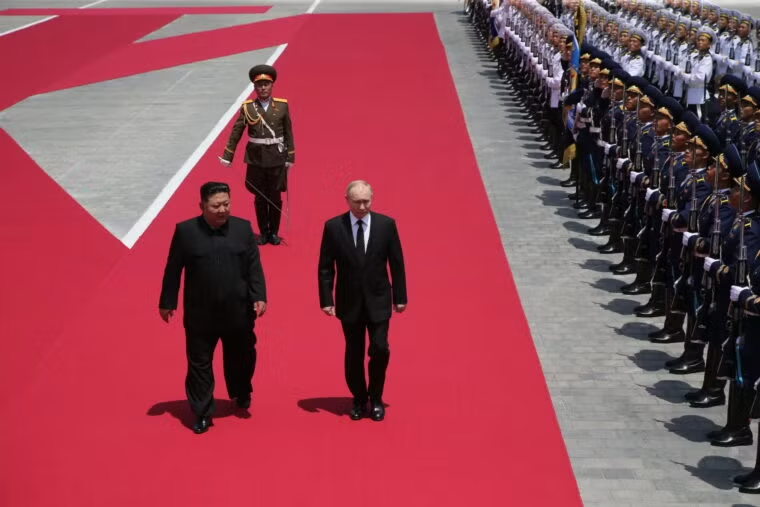Interviews / Asia-Pacific
27 June 2024
Closer Ties Between Russia and North Korea: A Security Threat on the Korean Peninsula?

Lavishly received in Pyongyang on 19 June, Vladimir Putin met with North Korean leader Kim Jong-un, nine months after the latter’s visit to Russia. What were the stakes of this visit? What is the current state of relations between Russia and North Korea ?
This official visit by Vladimir Putin to North Korea was first and foremost an opportunity to reaffirm the commitments made last autumn during a meeting between the two leaders in Siberia. At the time, Pyongyang had agreed to supply munitions (and possibly weapons) to Russia for its front in Ukraine. In return, Moscow had promised technological support to North Korea in the field of space (and most likely ballistics). This time, a defence agreement has been put forward, including a pledge of mutual support. In concrete terms, this means that North Korea will intensify its deliveries of military equipment to Russia and firmly backs its initiative in Ukraine. It also implies that Russia is now a North Korean ally in its rivalry with Seoul — a status not seen since the end of the Cold War and the dissolution of the Soviet Union.
As a result, Moscow could provide military assistance to its ally in the event of an escalation with South Korea (and the United States, as well as Japan), or even an armed confrontation. It also means — and this is worrying — that Moscow now de facto accepts North Korea’s nuclear armament, thereby undermining efforts to initiate constructive dialogue on the issue (even if such efforts have so far proved fruitless).
Alarmed by the announcement of the Russia–North Korea treaty, South Korea has stated that it is considering supplying arms to Ukraine. What is the current state of relations between the two Koreas in today’s international context ? Can we speak of a risk of escalation on the Korean Peninsula ?
Behind the Moscow–Pyongyang agreement, it is the relationship between Russia and South Korea that deserves close attention. This relationship has deteriorated significantly since the start of the invasion of Ukraine, with Seoul being one of the few Asian countries to condemn Russian aggression and to implement a sanctions regime against Moscow.
Tensions escalated last autumn when, for the first time, South Korea considered the possibility of sending weapons to Ukraine, prompting the ire of Moscow and accelerating its rapprochement with Pyongyang. Russia is now seeking not only to bolster its influence in Northeast Asia — which has gradually diminished to near irrelevance since the fall of the Soviet Union — but also to exert pressure on South Korea by targeting its most sensitive issue: inter-Korean relations.
This attitude can of course be condemned, but the incredible naivety of Seoul and President Yoon Suk-yeol — significantly weakened by the legislative elections in the spring — must also be lamented, along with the potential backlash from South Korean conservatives. The risk of escalation is high, and more than ever, the Korean Peninsula stands out as the region’s most significant security flashpoint.
Regarding Beijing, how has China responded to this strategic rapprochement between Moscow and Pyongyang ? Does it fear that this could strengthen the American presence in the region ?
China is North Korea’s preferred partner — though a partner that has learned to be wary of its unruly neighbour, notably condemning its nuclear and ballistic programmes. Nevertheless, since the end of the Cold War, Beijing has established itself as the only country capable of exerting influence over Pyongyang.
With this spectacular rapprochement between North Korea and Russia, China loses a lever — all the more so because it is unthinkable for Beijing to support any pressure exerted on South Korea, with whom it maintains close ties. In other words, China cannot welcome Russia’s triumphant return to the region, regardless of Washington and Tokyo’s posture on the matter.
However, Beijing still retains a decisive role through its ability to exert economic pressure on Pyongyang, whose economy is entirely dependent on China. To make this leverage effective, though, it will be necessary — particularly on the American side — to accept the need to negotiate with Beijing.

